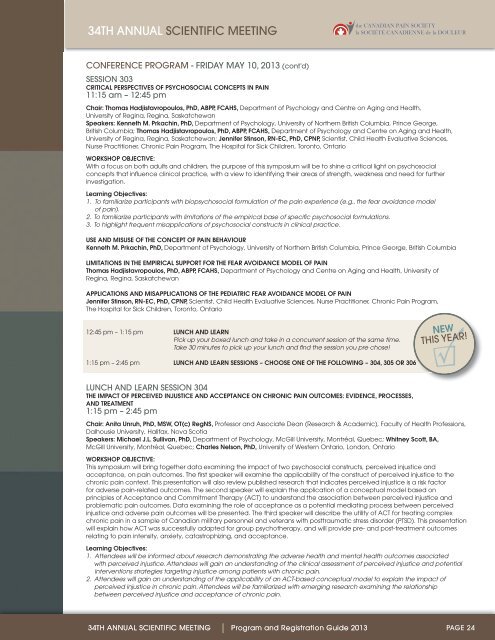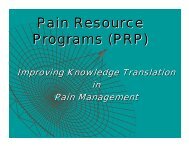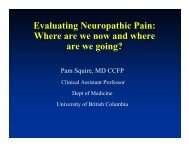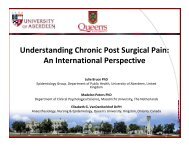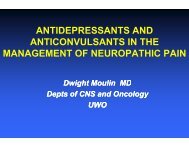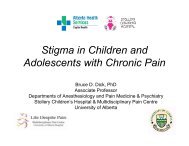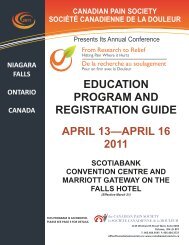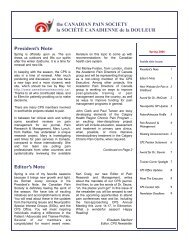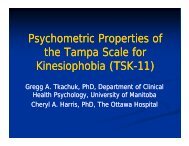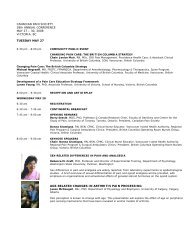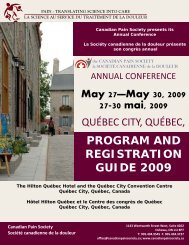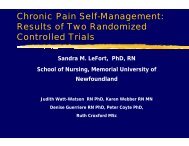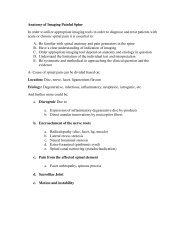Registration & Program Guide - The Canadian Pain Society
Registration & Program Guide - The Canadian Pain Society
Registration & Program Guide - The Canadian Pain Society
Create successful ePaper yourself
Turn your PDF publications into a flip-book with our unique Google optimized e-Paper software.
34TH ANNUAL SCIENTIFIC MEETING<br />
CONFERENCE PROGRAM - FRIDAY MAY 10, 2013 (cont’d)<br />
SESSION 303<br />
CRITICAL PERSPECTIVES OF PSYCHOSOCIAL CONCEPTS IN PAIN<br />
11:15 am – 12:45 pm<br />
Chair: Thomas Hadjistavropoulos, PhD, ABPP, FCAHS, Department of Psychology and Centre on Aging and Health,<br />
University of Regina, Regina, Saskatchewan<br />
Speakers: Kenneth M. Prkachin, PhD, Department of Psychology, University of Northern British Columbia, Prince George,<br />
British Columbia; Thomas Hadjistavropoulos, PhD, ABPP, FCAHS, Department of Psychology and Centre on Aging and Health,<br />
University of Regina, Regina, Saskatchewan; Jennifer Stinson, RN-EC, PhD, CPNP, Scientist, Child Health Evaluative Sciences,<br />
Nurse Practitioner, Chronic <strong>Pain</strong> <strong>Program</strong>, <strong>The</strong> Hospital for Sick Children, Toronto, Ontario<br />
WORKSHOP OBJECTIVE:<br />
With a focus on both adults and children, the purpose of this symposium will be to shine a critical light on psychosocial<br />
concepts that influence clinical practice, with a view to identifying their areas of strength, weakness and need for further<br />
investigation.<br />
Learning Objectives:<br />
1. To familiarize participants with biopsychosocial formulation of the pain experience (e.g., the fear avoidance model<br />
of pain).<br />
2. To familiarize participants with limitations of the empirical base of specific psychosocial formulations.<br />
3. To highlight frequent misapplications of psychosocial constructs in clinical practice.<br />
USE AND MISUSE OF THE CONCEPT OF PAIN BEHAVIOUR<br />
Kenneth M. Prkachin, PhD, Department of Psychology, University of Northern British Columbia, Prince George, British Columbia<br />
LIMITATIONS IN THE EMPIRICAL SUPPORT FOR THE FEAR AVOIDANCE MODEL OF PAIN<br />
Thomas Hadjistavropoulos, PhD, ABPP, FCAHS, Department of Psychology and Centre on Aging and Health, University of<br />
Regina, Regina, Saskatchewan<br />
APPLICATIONS AND MISAPPLICATIONS OF THE PEDIATRIC FEAR AVOIDANCE MODEL OF PAIN<br />
Jennifer Stinson, RN-EC, PhD, CPNP, Scientist, Child Health Evaluative Sciences, Nurse Practitioner, Chronic <strong>Pain</strong> <strong>Program</strong>,<br />
<strong>The</strong> Hospital for Sick Children, Toronto, Ontario<br />
12:45 pm – 1:15 pm LUNCH AND LEARN<br />
Pick up your boxed lunch and take in a concurrent session at the same time.<br />
Take 30 minutes to pick up your lunch and find the session you pre chose!<br />
9<br />
1:15 pm – 2:45 pm LUNCH AND LEARN SESSIONS – CHOOSE ONE OF THE FOLLOWING – 304, 305 OR 306 NEW<br />
THIS YEAR!<br />
LUNCH AND LEARN SESSION 304<br />
THE IMPACT OF PERCEIVED INJUSTICE AND ACCEPTANCE ON CHRONIC PAIN OUTCOMES: EVIDENCE, PROCESSES,<br />
AND TREATMENT<br />
1:15 pm – 2:45 pm<br />
Chair: Anita Unruh, PhD, MSW, OT(c) RegNS, Professor and Associate Dean (Research & Academic), Faculty of Health Professions,<br />
Dalhousie University, Halifax, Nova Scotia<br />
Speakers: Michael J.L. Sullivan, PhD, Department of Psychology, McGill University, Montréal, Quebec; Whitney Scott, BA,<br />
McGill University, Montréal, Quebec; Charles Nelson, PhD, University of Western Ontario, London, Ontario<br />
WORKSHOP OBJECTIVE:<br />
This symposium will bring together data examining the impact of two psychosocial constructs, perceived injustice and<br />
acceptance, on pain outcomes. <strong>The</strong> first speaker will examine the applicability of the construct of perceived injustice to the<br />
chronic pain context. This presentation will also review published research that indicates perceived injustice is a risk factor<br />
for adverse pain-related outcomes. <strong>The</strong> second speaker will explain the application of a conceptual model based on<br />
principles of Acceptance and Commitment <strong>The</strong>rapy (ACT) to understand the association between perceived injustice and<br />
problematic pain outcomes. Data examining the role of acceptance as a potential mediating process between perceived<br />
injustice and adverse pain outcomes will be presented. <strong>The</strong> third speaker will describe the utility of ACT for treating complex<br />
chronic pain in a sample of <strong>Canadian</strong> military personnel and veterans with posttraumatic stress disorder (PTSD). This presentation<br />
will explain how ACT was successfully adapted for group psychotherapy, and will provide pre- and post-treatment outcomes<br />
relating to pain intensity, anxiety, catastrophizing, and acceptance.<br />
Learning Objectives:<br />
1. Attendees will be informed about research demonstrating the adverse health and mental health outcomes associated<br />
with perceived injustice. Attendees will gain an understanding of the clinical assessment of perceived injustice and potential<br />
interventions strategies targeting injustice among patients with chronic pain.<br />
2. Attendees will gain an understanding of the applicability of an ACT-based conceptual model to explain the impact of<br />
perceived injustice in chronic pain. Attendees will be familiarized with emerging research examining the relationship<br />
between perceived injustice and acceptance of chronic pain.<br />
34TH ANNUAL SCIENTIFIC MEETING <strong>Program</strong> and <strong>Registration</strong> <strong>Guide</strong> 2013 PAGE 24


